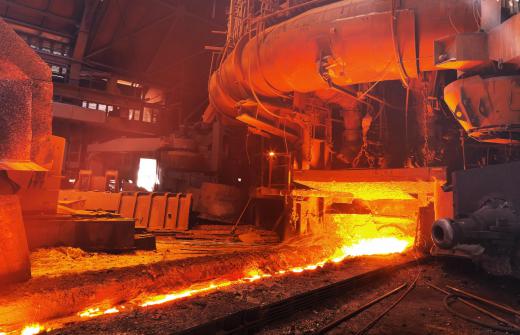Pot metal is a slang term used to refer to cheap metal alloys with a low melting point. The low melting point makes this metal very easy to cast, but the generally low quality can cause problems during casting and at a later date. There is no formal definition of pot metal, so it can be hard to determine its contents. Some common metals included in such alloys include zinc, lead, copper, and tin, among others.
The mixed contents of pot metal make it highly unpredictable, which can be a problem for people who are trying to create specific items. It has a tendency to become very soft and porous, and over time, it is subject to deformity. It also tends to break or bend easily, making it unsuitable for many tasks, and because some of the metals commonly included are toxic, this type of metal can also be hazardous to human health.

Rapid and easy casting is the primary advantage to pot metal. No sophisticated foundry tools are needed, as comparatively low temperatures are needed to turn it into a castable liquid, and specialized casts and molds aren't necessary either. Some people like to use pot metal to play around in the foundry, experimenting with molds and ideas before using metals of higher quality, and this metal can be useful in the production of some items.
This metal can be difficult to plate, because of its often unknown properties. Many people attempt to plate pot metal to protect it or to conceal its origins; it tends to be a dull gray color when left unplated. Objects made with this type of metal are also difficult to repair, as they tend to take poorly to welding, soldering, or gluing, techniques typically used to repair other broken metal objects.
Some people refer to pot metal disparagingly as "monkey metal," and it is also sometimes referred to as "die-cast zinc" or "white metal," among other names. Ingots for melding and casting are available from many metallurgical companies, and some people make their own pot metal, breaking down various scrap metal objects around the shop and melting them down into an alloy. Foundries may also sell scrap to people looking for a cheap source of metal, although such scrap sometimes contains an assortment of impurities which may prove problematic later.
